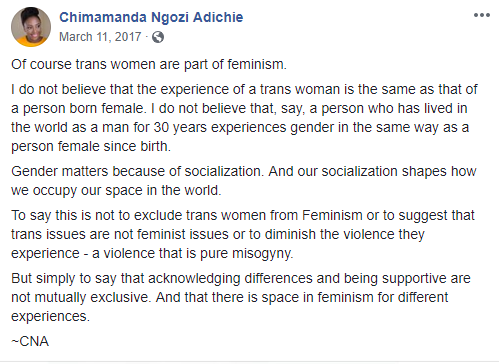Gender Socialization is Real (Complex)
No one is simply “socialized male” or “socialized female”.
No one is simply “socialized male” or “socialized female”.
One of the common tools used to bludgeon trans people, particularly trans women, is the concept of gender socialization. This concept holds, in most cases, that babies who are assigned male at birth are taught to be boys in all ways, and internalize the entitlement, confidence, aggressiveness, and even predatory nature that many men are culturally poisoned with. Conversely, if someone is assigned female at birth, this viewpoint holds they have been socialized to be self-effacing, considerate, giving, and gentle.
From alt-right transphobes like Ben Shapiro to faux-scientific transphobes like Jesse Singal to casually transmisogynistic feminists like Chimamanda Ngozi Adiche , the sentiment that trans people are “raised as” the gender they were assigned at birth is both prevalent and toxic. Here’s an example of how it can be articulated:

What’s most maddening to me, as a researcher, is that this theory of simple, binary gender socialization is so often seen as common sense. If society thinks you’re a boy, you’re raised to behave, think and feel like a boy, the logic goes. In a sense, you are tainted by how you were raised, and never truly capable of fully embodying any other gender after that. Even if you do learn to perform the behaviors of another gender, according to this theory, you will never escape your initial years of being seen and treated as a “boy” or a “girl”.
Upon closer inspection, this (nonscientific) theory is obviously too simple. It falls apart under even mild scrutiny and questioning. What does it mean to be “socialized female”? What experiences must you have to count as being “socialized male”? If a child was constantly punished for not fulfilling their assigned gender role well, were they really socialized into that role? What if a child knows from a very young age that they aren’t male or female, and don’t buy into the norms associated with those genders? If a 33-year-old trans woman was seen as a “boy” for the first 13 years of her life, but then lived as a woman for the following 20 years, was she socialized female, or male? What if I spent my whole life being told to act like a woman, but I knew I wasn’t one, so I refused?
Gender socialization is complicated. It’s so complicated, in fact, that I’d like to posit that no person is socialized in the exact same way. Just as I have previously suggested that every person has their own unique gender and relationship to that gender, I’d like to further suggest that every person has their own unique gender socialization.
…
I don’t know that I have ever read a take on gendered socialization that is appropriately complex. For the most part, I encounter two takes on the subject. The first is the typical, “common sense transphobia” take. It goes something like this:
1. Gender socialization is a real process based on your assigned gender at birth. Afab kids are raised to be kind, self-effacing, emotionally attentive girls; amab kids are raised to be entitled, rowdy, aggressive boys. Even if you transition out of that gender, you have been trained to embody the norms of that gender.
This take is dangerous and does not jibe with a lot of trans people’s actual lived experiences. The other take is usually presented as a reaction to the first take. It is well-intentioned, and usually voiced by trans people and our allies:
2. Gender socialization is a dangerous and inaccurate concept. Trans men are men, trans women are women, and neither can fairly be said to have been “socialized as” the gender they were assigned at birth.
Usually, take #2 is presented as a response to take #1. And in a lot of trans circles, talk of socialization is immediately seen as suspect and dangerous, with good reason. “Socialization” as a concept is frequently used to attack trans women and trans feminine people, and to portray them as predatory and less versed in “womanhood” than cis women.
But socialization, as a process of learning and internalizing cultural norms, is a genuine social and developmental process. When discussed in a more nuanced, personalized, and dynamic way, it can speak to very meaningful trans experiences. Socialization involves which expectations are placed on a person, perhaps, but crucially, it also involves which expectations a person internalizes and applies to themselves. When we discuss the gendered “socialization” of trans kids, we need to be able to acknowledge that. And we also need to acknowledge how complicated and ongoing the process of socialization is — as well as the fact that socialization is a two-way street, both something that happens to a person and something that they push back against or respond to.
So, let’s do it. Let’s talk about gender socialization.
…
All children who exist in a gendered society grow up exposed to gendered roles, norms, expectations, and stereotypes. They may be explicitly, directly instructed to perform certain gender norms, but they also learn a great deal about gender implicitly (by looking at patterns of behavior in their social world). All children, regardless of their gender, are exposed to norms for both men and women. These exposures influence their expectations for themselves and others.
Psychologists and educators have known for a long time that children pick up on gender norms and stereotypes very quickly and effortlessly. The developing brain is excellent at overgeneralization — identifying a social pattern and then applying it with ruthless strictness. This is part of why children can sound like sexists and bigots, or can draw overly certain conclusions about how the world works based on very minimal information. Children are also more likely to perform gender-normative behavior when they are aware they are being observed.
Children are little aliens who have been dropped into a strange world with many unspoken rules, and many of them are adept at learning those rules through observation and pattern recognition. Even if you never tell your child that only women can be stay-at-home parents, if the vast majority of stay-at-home parents they witness in real-life and in media are women, they will come to associate that kind of parenting with femininity and womanhood. A boy doesn’t have to be beaten up for crying in order to develop toxic masculinity — all it may take is him noticing that when he is sad, he is treated more coldly than a girl. This may even eventually lead him to stereotype girls as more emotional and tender.
I hope it’s clear, at this point, that all people notice gender norms for genders other than their own. Boys learn which behaviors are expected of girls, and vice versa. As binary as our world is, no gender is raised in a vacuum without exposure to others. And often, trans people learn and internalize gender norms for their true gender identity rather than they gender they were labeled as at birth. And while norms are being applied to a child, that child is also adapting and responding back towards those norms, creating a dynamic relationship of expectation, response, and reaction.
There is no singular socialization experience. And the socialization process never ends or stops evolving.
…
I was assigned female at birth. Most cis people would say I was “female socialized”. That’s not quite true.
It would be more accurate to say that people pushed female norms onto me, and I tended to either dismiss those norms, or fail at them. I thereafter received the socialization that typically follows a child failing to meet gendered norms. I was, to an extent, perceived and socialized as a gender fuck-up, not as a girl.
I was not appropriately boy crazy. I was not great at maintaining a meticulous appearance. I was not always capable of communicating in gentle, smiling, self-effacing ways. I could not perform the kind of laughing, easy joy girls were expected to radiate. I was adept at meeting some female norms— I loved animals, I was quiet, I was naturally thin — but at most others, I was a failure or a conscientious objector, and my social standing suffered for it.
I also learned really pernicious male gender norms, and I internalized some of those as well. I always knew on some level that I wasn’t a cis girl, and I automatically dismissed some female gender norms that struck me as ill-fitting or unfair. I was always very very averse to expressing emotional pain or weakness. I always emulated men in terms of how authoritatively I spoke or expressed ideas. Throughout my life, I have wanted to be more like (stereotypical) men in terms of assertiveness and directness. When I imagined myself having children, I always envisioned taking on a more stereotypically “fatherly” role. I have the entitlement of a man in a lot of ways.
I have been undercut in some of the ways women usually are. I have been expected by partners, peers, professional colleagues, and even family to be an emotional caretaker, even though I have always been bad at it and did not feel that it should be my responsibility. I am more hesitant, attentive to others’ feelings, and inclined toward emotional labor than your average cis man … but vastly less than your average woman. I have felt some pressure to get married and have children, but less than the average woman. I do feel some physical fear of men, but I am much more comfortable walking alone at night than any woman I know.
I can’t really say that I was socialized male or socialized female. I got some female treatment, but it didn’t sink in as deeply as it does for many trans and cis women. I noticed and internalized some male norms, even though I haven’t ever been seen as a man out in the real world. And since I’m nonbinary, most norms for either gender strike me as pretty ridiculous. I’d rather be free of most of them entirely. I’ve also lived openly as a nonbinary person since the summer of 2016, and my treatment thereafter can be framed as an ongoing nonbinary socialization experience.
It’s hard to pin down what my experience of socialization is in any kind of simple way. Do I have male privilege? Do I have the magical concoction of suffering and sensitivity that supposedly makes women morally superior to men? My socialization, my reaction to it, and people’s reactions to me are all very complicated. But that doesn’t mean gender socialization didn’t happen to me.
…
I have known a lot of trans people at this point, and a lot of them have very different takes on what their socialization experience was. I know trans women who talk about having had some male privileges prior to transitioning. I know others who never were seen or treated like cis men at any point in their lives. I know trans men who say they were treated with more kindness and delicacy before they transitioned. I know others who report experiencing way more validation, praise, and approval when they began being seen as men.
I know trans people who immediately were treated to a deluge of gender policing the second they came out — cis women correcting their makeup, cis men treating them to locker-room talk of sexism and predation to “welcome” them into manhood. I’ve met trans people who were punished and gender policed for their entire pre-transition lives, because they failed to embody their assigned gender “correctly”. And I know trans people who had pretty easy lives in a variety of presentations and roles.
There are trans feminine people who had feminine mannerisms their whole lives, who were sorely punished for it. There are trans men who received no negative consequences for being masculine as children, but who started getting harassed for the same behaviors as a teen or an adult. There are people like Youtuber Kat Blaque, who was read as a woman long before she even transitioned, and who frequently pushes back against the idea that trans women have all been socialized male for that reason. There are writers like Grace Lavery, who reports having been treated as a man in some areas of her pre-transition life, but not in others.
There is no singular socialization experience. And socialization never stops.
…
And all of this is to say nothing of how gender norms vary by culture and subculture. Most mainstream talk of gendered socialization is focused on very stereotypic white, middle-class roles. That is not the sole experience of gender socialization. It’s not even the majority one. Not all women are raised to be delicate caretakers who stay at home. Standards and expectations associated with masculinity vary from culture to culture. I can’t really speak fairly to those nuances because I was raised in a white, middle-class mileu, but I know enough to know that’s not the norm, and that each culture’s gender norms influence how people act, present, and identify in unique ways. I’m sorry that I can only speak to this with a tacked-on aside, but I do have to at least acknowledge it as a massive caveat.
…
What is the summary take-away for all this, then? For me, it’s as simple as this: trust people to describe their own experiences of gendered socialization, and don’t generalize about how other people must have been socialized. Don’t assume that a person’s assigned gender at birth has fated them to have any specific traits or predilections as a matter of course.
Socialization exists. It affects how we present, feel, think, and act. It evolves and shifts as we change and our society evolves. It is hard to pin down or summarize. It is real, but it is as complex and personal as gender identity itself.









